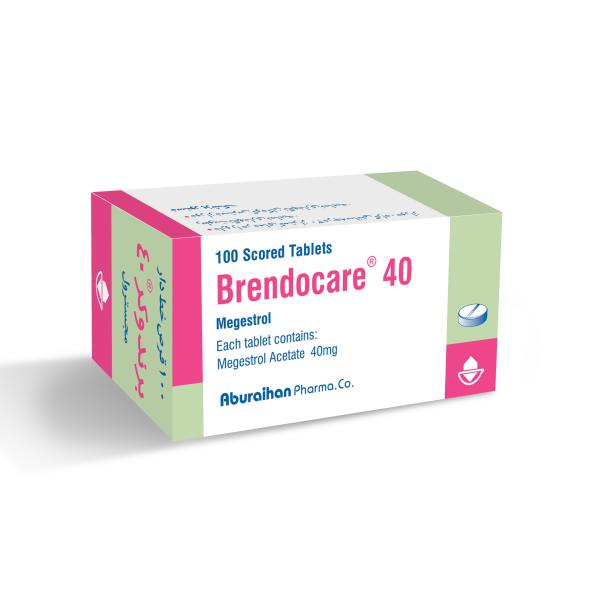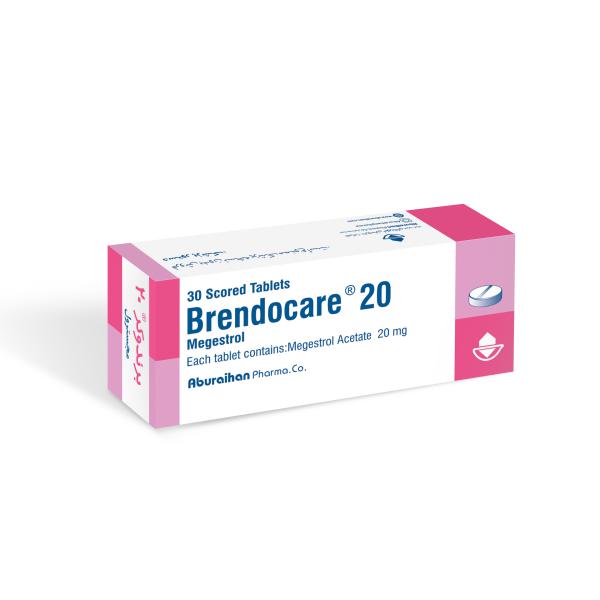Brendocare®
Megestrol
tablet
Breast cancer, Endometrial cancer, Cancer-related cachexia
Mechanism of Action:
Megestrol is a synthetic progestin with antiestrogenic properties which disrupt the estrogen receptor cycle. Megestrol interferes with the normal estrogen cycle and results in a lower LH titer. May also have a direct effect on the endometrium. Megestrol is an antineoplastic progestin thought to act through an antileutenizing effect mediated via the pituitary. May stimulate appetite by antagonizing the metabolic effects of catabolic cytokines.
Method of Administration:
Breast cancer, advanced: Tablet: Oral: 160 mg per day in divided doses of 40 mg 4 times daily for at least 2 months.
Endometrial cancer, advanced: Tablet: Oral: 40 to 320 mg daily in divided doses for at least 2 months.
Notes
Hypersensitivity to megestrol or any component of the formulation; known or suspected pregnancy
Interactions:
Antidiabetic Agents: Hyperglycemia-Associated Agents may diminish the therapeutic effect of Antidiabetic Agents. Risk C: Monitor therapy
Dofetilide: Megestrol may increase the serum concentration of Dofetilide. Risk X: Avoid combination
Ulipristal: May diminish the therapeutic effect of Progestins. Progestins may diminish the therapeutic effect of Ulipristal. Risk X: Avoid combination
Vitamin K Antagonists (eg, warfarin): Megestrol may increase the serum concentration of Vitamin K Antagonists. Risk C: Monitor therapy
Pregnancy and Lactation:
Based on data from animal reproduction studies, megestrol may cause fetal harm if administered during pregnancy. Use is contraindicated for the treatment of anorexia or cachexia in pregnant patients with HIV infection.
Due to the potential for adverse reaction in the breastfed newborn, it is recommended to discontinue breastfeeding while receiving megestrol for the treatment of cancer. Due to the potential for HIV transmission, breastfeeding is not recommended when treating anorexia or cachexia associated with HIV infection.
Warning and Precaution:
- Adrenal suppression: May suppress hypothalamic-pituitary-adrenal (HPA) axis during chronic administration; consider the possibility of adrenal suppression in any patient receiving or being withdrawn from chronic therapy when signs/symptoms suggestive of hypoadrenalism are noted (during stress or in unstressed state). Laboratory evaluation and replacement/stress doses of rapid-acting glucocorticoid should be considered.
- Bleeding irregularities: Vaginal bleeding or discharge may occur.
- Cushing syndrome: Has been reported with long-term use.
Adverse Reactions:
Cardiovascular: Hypertension (4% to 8%), cardiomyopathy (1% to 3%), chest pain (1% to 3%), edema (1% to 3%), palpitations (1% to 3%), peripheral edema (1% to 3%), cardiac failure
Central nervous system: Headache (3% to 10%), pain (4% to 6%, similar to placebo), insomnia (1% to 6%), abnormality in thinking (1% to 3%), confusion (1% to 3%), convulsions (1% to 3%), depression (1% to 3%)
Dermatologic: Skin rash (6% to 12%), alopecia (1% to 3%), dermatological disease (1% to 3%), diaphoresis (1% to 3%), pruritus (1% to 3%), vesicobullous dermatitis (1% to 3%)
Endocrine & metabolic: Hyperglycemia (6%), decreased libido (1% to 5%), albuminuria (1% to 3%), gynecomastia (1% to 3%), increased lactate dehydrogenase (1% to 3%), adrenocortical insufficiency, amenorrhea, Cushing’s syndrome, diabetes mellitus, hot flash, HPA-axis suppression, hypercalcemia, weight gain (not attributed to edema or fluid retention)
Gastrointestinal: Diarrhea (10%, similar to placebo), flatulence (6% to 10%), vomiting (4% to 6%), nausea (4% to 5%), dyspepsia (2% to 3%), abdominal pain (1% to 3%), constipation (1% to 3%), oral moniliasis (1% to 3%), sialorrhea (1% to 3%), xerostomia (1% to 3%)
Genitourinary: Impotence (4% to 14%), urinary incontinence (1% to 3%), urinary tract infection (1% to 3%), urinary frequency (1% to 2%), breakthrough bleeding
Storage:
Store below 30ºC and protect from light and moisture.


